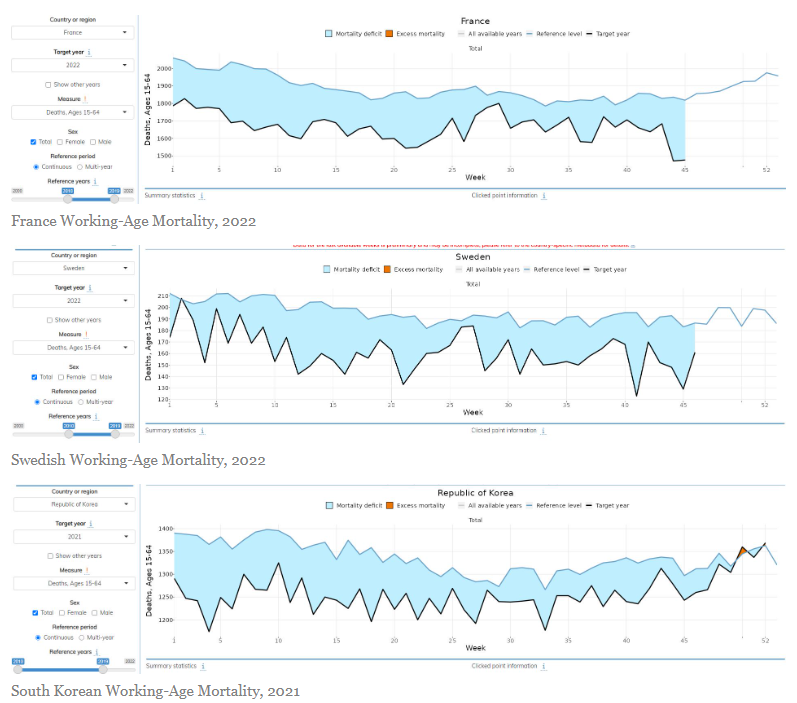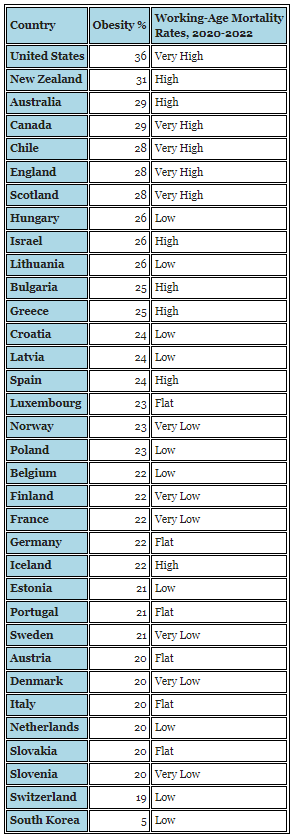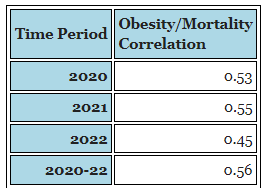By Ron Unz
January 10, 2023
Over the last couple of years, our alternative media website has been flooded by a vast number of zealous anti-vaxxers, promoting their fears of the Covid vaccines with tremendous energy and commitment.
On its face, such concerns with the Covid vaccination drive hardly seem unreasonable. The vaccines used in most Western countries have been based upon an entirely new mRNA technology, in which the body's own cellular machinery is actually hijacked to produce portions of the Covid spike-protein, and new medical innovations sometimes have negative consequences. The lockdowns originally implemented to control the Covid epidemic proved highly unpopular and increasingly unworkable, so the vaccines were rushed into production and release, circumventing the long process of clinical trials that would otherwise have been required.
It's hardly surprising that many people would be unnerved by the widespread use of a radical new medical technology introduced without sufficient testing.
But I don't have any background in medicine or microbiology, and it seemed that the overwhelming majority of medical professionals believed that the risks of the Covid vaccine were considerably lower than the risks of serious Covid illness. So after waiting a few months, I got myself vaccinated in mid-2021. Neither I nor anyone I knew had any ill effects from the shots, and I soon stopped paying much attention to the issue.
Meanwhile, the alarms raised by some of the louder anti-vaxxers became more and more extreme, sometimes predicting that the vaccinations would kill millions or even many hundreds of millions. Quite a lot of the anti-vaxxers on this lightly moderated website also began cluttering up unrelated articles with their fervent anti-vaxxing comments, which greatly irritated me.
Although I wasn't much interested in the issue, I decided that the anti-vaxxers sounded like a bunch of total crack-pots and said so in an interview, immediately provoking an avalanche of overwhelmingly hostile responses, which eventually totaled more than 850,000 words.
- Are the Opponents of the Covid Injections "Anti-Vaxx Crackpots"? Mike Whitney Interview with Ron Unz The Unz Review • August 1, 2021 • 9,000 Words • 1,681 Comments
Since then, every six months or so, I've published another column on the vaxxing controversy, pointing to the increasingly strong indications that anti-vaxxing concerns had been hugely exaggerated and there was very little evidence the vaccines were causing any significant numbers of deaths. Each time, my remarks have aroused another huge wave of extremely angry responses from militant anti-vaxxers:
- Covid Deaths and Vaxxing Deaths The Unz Review • January 17, 2022 • 2,800 Words • 1,409 Comments
- Vaxxing Conspiracies and 700,000 Rumble Views The Unz Review • July 18, 2022 • 2,800 Words • 941 Comments
- Vaxxing Deaths or Covid Deaths? The Unz Review • January 2, 2023 • 3,300 Words • 1,036 Comments
In my latest article published last week, I noted that most anti-vaxxers have claimed that Covid vaccinations had produced a large wave of fatal heart attacks and strokes. However, although American deaths from those causes have indeed risen quite substantially from 2019, nearly all of that increase occurred in 2020, before the Covid vaccination drive began, while the numbers remained almost unchanged in 2021 and 2022. This suggested that the rise was caused by the Covid infections of 2020 rather than the vaccines later deployed to control them, and scientific studies have already demonstrated that even mild Covid infections lead to a greatly increased future risk of heart attacks and strokes. And if the massive amount of vaxxing and boosting that began early in 2021 had almost no impact upon such mortality totals, it seemed unlikely that they have been causing very many deaths.
I had summarized my findings in a few simple points:
- Vaxxing only began on December 14, 2020, so it would have had almost no public health impact during that year.
- Except for homicides and accidents, nearly all the major changes in American death rates occurred in 2020, so these must have been due to Covid.
- Except for homicides and accidents, non-Covid deaths rates showed almost no change in 2021 and 2022, so the vaccines probably had no impact one way or the other.
After publishing that piece, I had planned to once again set aside the topic for another half-year or so, then review six additional months of data that I expected would further strengthen my original conclusions. However, some additional information was soon brought to my attention that seemed to finally settle the vaxxing controversy once and for all.
First, a very level-headed commenter from Iceland calling himself "Niceland" noted that except for the elderly, his own country's population had experienced no noticeable increase in deaths during the last couple of years, despite the very heavy vaxxing regime it had followed. He then checked, and discovered that the same was true of Denmark and a couple of other nearby European countries. Since the overwhelming majority of the populations were vaxxed, and those younger than about 65 showed no significant excess mortality, it seemed unlikely that vaxxing had caused any substantial number of deaths.
Around the same time, someone else brought to my attention a very useful website affiliated with UC Berkeley and the Max Planck Institute that provides a very easy means of displaying decades of excess mortality statistics for dozens of countries. These mortality results presented can be stratified by gender and various age-groups, and the reference years used to calculate the "excess" can also be selected.
So I decided to repeat Niceland's analysis for all the countries available. I focused upon total deaths for working-age individuals age 15-64, used the average mortality rates for the years 2010-2019 as the reference, and examined the totals for the years 2020, 2021, and 2022.
Covid mortality rates are very sharply age-skewed, with a huge fraction of the deaths concentrated in the elderly. Therefore, the particular age distribution of a country might easily overwhelm other factors in determining overall mortality rates, while focusing upon working-age individuals tends to minimize this distortion. Also, ordinary Covid deaths are relatively low in that age-range, allowing us to more easily detect the mortality impact of other possible factors such as vaxxing or "long Covid."
I quickly discovered that many of those nations had actually experienced large "mortality deficits" for that age group during those years. Far fewer working-age individuals had died during 2021 and 2022 than would have been predicted in 2019.
Some of the strongest examples of this remarkable effect included countries such as France, Sweden, South Korea, Denmark, Belgium, and Finland, but roughly half of all the countries using Western Covid vaccines had such noticeable mortality deficits. All of these countries were very heavily vaxxed, yet their working-age death rates had dropped below normal levels in those years, presumably because the lockdowns and social distancing had reduced deaths from other sorts of contagious diseases and from traffic accidents.
Here are a few of the mortality-rate graphs as examples, with the blue color representing the "mortality deficit," but anyone can go to the website and check any of the different countries and years.

Admittedly, there were also some European countries that had relatively flat death rates and a couple that showed substantial increases. But if many or most of these very heavily vaxxed countries showed sharp drops in their working-age death rates, it seemed very unlikely that the vaccines were responsible for killing significant numbers of such individuals.
When I mentioned my striking findings during a recent interview on Kevin Barrett's show, he raised the possibility that the wave of 2020 Covid infections had killed off many of the weakest individuals, thereby producing a decline in mortality rates during 2021 and 2022 that masked the additional deaths produced by the vaxxing. However, this could not have been the case for France or most of those other countries, which had also had mortality deficits during 2020 as well:
France Working-Age Mortality, 2020
These results are not nearly as surprising as they might seem. Under normal circumstances, Covid infections are only very rarely fatal to the non-elderly, and when we add the impact of the vaccines and the widespread appearance of the mild Omicron variant in late 2021, working-age Covid deaths would have been very low, apparently overwhelmed by the disappearance of other contagious diseases and sharp reductions in traffic accidents. So many European countries had unusually low working-age mortality rates for all of the last three years.
The United States, however, was an extreme outlier to this pattern, and our working-age population had very high "excess mortality" rates in both 2021 and 2022, as can be seen in the following couple of charts:
US Working-Age Mortality, 2021
US Working-Age Mortality, 2022
Such extremely high recent American death rates among the non-elderly probably helps to explain why large numbers of our citizens have become convinced that the vaccines used here have had deadly side-effects. However, this explanation seems unlikely since mortality rates had actually been just as high or even higher during most of 2020, starting with the earliest days of the Covid outbreak and rising long before the vaccination drive had begun at the end of that year:
US Working-Age Mortality, 2020
So while many other countries have experienced three consecutive years of unusually low working-ages death rates, our own unfortunate country has had three consecutive years of unusually high mortality, the worst results by far for any developed nation.
Although there are many possible reasons for America's disastrous performance, the likeliest explanation becomes obvious once we explore which other countries have also had large increases in mortality. Those having the highest rates of working-age excess deaths include Canada, Chile, England, and Scotland. For example, Canada's 2020 mortality results looked quite similar to our own, except that its Covid epidemic began a few weeks earlier than the one in the US.
Canada Working-Age Mortality, 2020
These countries may be politically and economically dissimilar, but they all place very high in the international obesity rankings, with the US easily leading the developed world in that physical measure. We know that the Covid disease is much more likely to be serious or fatal among the obese, so it's hardly surprising that deaths among such working-age individuals would be greatly elevated compared with those for the relatively slimmer populations of Sweden, France, Denmark, Finland, and various other countries.
More than thirty of the countries whose mortality statistics are available on the HMD website also have their obesity rates shown by the World Populations Review website, and it's not difficult to produce a table providing these along with their working-age mortality results for 2020-2022, listed by descending obesity percentages:

Although the match is far from perfect, there does seem to be a strong relationship between the obesity of the countries and their relative mortality rates for 2020-2022. All the countries with the highest obesity rates had high or very high mortality rates, while the countries with the lowest obesity rates generally had low or very low mortality rates.
On a quantitative basis, if we compare the national obesity figures to the working-age excess mortality percentages across those countries, we get moderately strong correlations:

Since we know that the severity of the Covid illness is heavily influenced by obesity, this strongly reinforces our conclusion that Covid infections were the main driving factor in these mortality differences. And although there are some exceptions, nearly all the countries whose working-age populations had high mortality results in 2021 and 2022 had also had high mortality results in 2020, before the vaccinations had begun. This suggests that the combination of Covid infections with obesity had been responsible rather than the vaccinations.
I recently discussed all these issues with Kevin Barrett on his show, and here's a link for those who would like to listen to our hour-long discussion:
Unless anti-vaxxers can produce a more plausible explanation for this very strong international pattern, their hypothesis that the vaccines rather than the lingering consequences of Covid infections are causing significant numbers of deaths seems to have been decisively refuted. Thus, I think that the bitter vaxxing debate of the last couple of years may now be nearly over.
In the past I've been told that prominent critics of the Covid vaccines such as Steve Kirsch and Bret Weinstein have challenged anyone to debate them on the issue, and some had suggested that I do so, but I've always demurred. Although my very occasional columns on the subject have been strongly skeptical of the anti-vaxxing position, I've never felt that they made a sufficiently strong affirmative case on the other side to be worth presenting.
However, I do now regard my recent pair of articles as quite conclusive on the subject, and I would welcome an opportunity to debate my analysis with Kirsch, Weinstein, or any other prominent anti-vaxxers.
Meanwhile, I find it far more puzzling that the large role that national obesity levels seem to have played in determining the mortality rates of the last three years hasn't already become the subject of numerous high-profile academic studies in the medical journals, heavily promoted in the mainstream media. For example, I had had no inkling that the differences in working-age mortality rates across those countries were so extreme until I explored the numbers on that HMD website a few days ago, and the explanation for those striking variations quickly became obvious.
Regarding an unrelated aspect of the Covid epidemic, I have been very pleased at the considerable wave of interest my podcast interviews from last February on the origins of the virus have recently received, accumulating over 120,000 additional views in just the last week.
Since April 2020, I have published a long series of articles making the case that the Covid outbreak was due to an American biowarfare attack against China (and Iran), and my analysis is conveniently presented in those discussions.
- Covid/Biowarfare Series Ron Unz • The Unz Review • April 2020-December 2021 • 60,000 Words
In particular, one of those interviews just broke a million views on Rumble, with another now passing 800,000 views and likely to eventually reach that same milestone.
One of the most popular stars on Rumble is rightwinger Dan Bongino, and only two of his many hundreds of s have reached the million mark, while the same is also true for Glenn Greenwald, the most prominent journalist using that platform.
So my Covid interviews seem to have become among the most extremely popular videos on that small but relatively uncensored platform, and without shadow-banning, I think they would have accumulated an order-of-magnitude more viewership on Youtube, given the latter's vastly larger audience.
Kevin Barrett, FFWN • February 16, 2022 • 15m
rumble.comGeopolitics & Empire • February 1, 2022 • 75m
rumble.comRed Ice TV • February 3, 2022 • 130m
rumble.comReprinted with permission from The Unz Review.




